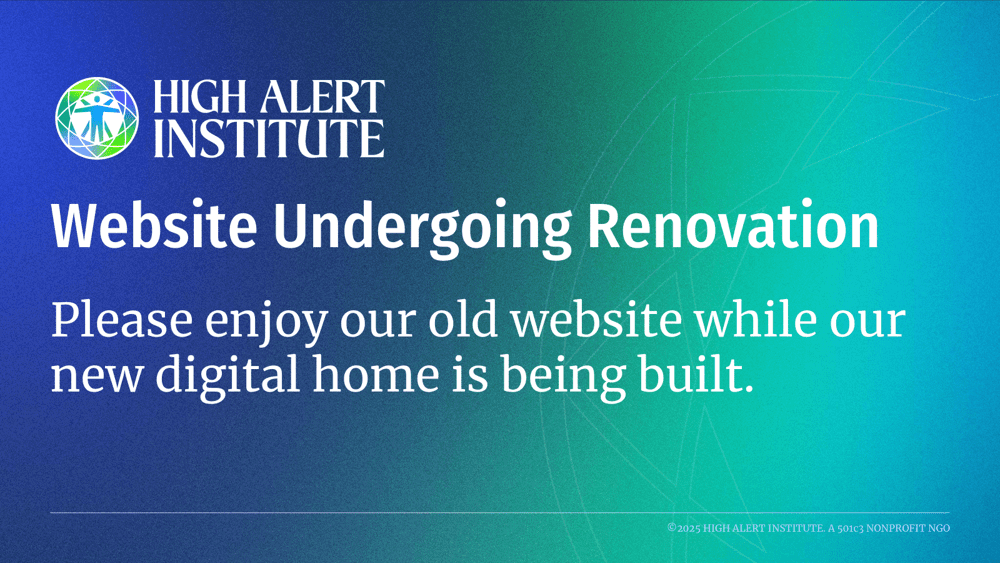High Alert Institute
What a Great Idea

Kevin Freking, of the Associated Press reports on the first major corporate sponsorship of portable electronic medical records. Applied Materials, BP America, Inc., Intel Corp., Pitney Bowes and Wal-Mart will enroll employees in a central database to maintain health records in an effort to eliminate duplication, omission and error.
This is a concept that is supported by President Bush and the National Academy of Science – Institute of Medicine. Not only will the system collect medical record information and reports to a central repository, but individuals will be able to provide personal and family information to augment the record. This type of system is envisioned by the White House as a national standard by 2014 and is a requirement for implementation by medical providers by 2008. The problem with this online repository database is that it is internet dependent and while accessible from any internet portal, it is not truly portable. You cannot carry it self contained in your hand.
But, what if there were a way to carry a copy of such vital data in the palm of your and, or in a watch, wristband, pocket card, etc.?
- David Stephenson of Stephenson Strategies made a fantastic suggestion in his September 26, 2006 blog entry. He suggested that people carry their medical records on secure U3 enabled USB drives. Such devices are already embedded in credit card sized wallet drives, wrist watches, necklaces, key rings, pens and every manner of business sundry.
As an Emergency Room physician, I’m not sure I would look for a USB drive in the pockets of a patient in the emergency room, but a USB drive watch, wrist and, pendent or wallet card would be useful. What a wonderful merger of form and function that could now save your life! David ends with the statement:
“This sounds like a real win-win technology that hits my sweet spot: convenient and usable every day (no more lugging laptops home from the office!), and, in a disaster, a literal and figurative lifesaver, because you’d not only have your medical records in hand, but also all of your critical applications and business files as well. It wouldn’t be ideal, but, in a worst case, you’d still be able to do limited business if you had access to a shared computer in a shelter — and, for emergency workers themselves, smart drives are going to be essential supplies.”
Currently there are 8 companies selling a solution similar to what David is suggesting. Unfortunately, none of these take advantage of the U3 technology David describes. One of the 8 companies is planning a U3 version in 6 months. Although all 8 companies claim password protection for the user interface, only one of the systems uses encryption to safeguard the data files from direct access by other software.
Also needed is the ability to ensure that the patient does not deliberately or accidentally alter the records, especially if the record includes notes from medical professionals as several of the systems do. Another nice feature would be the ability to synchronize with the electronic medical record (EMR) at the doctor’s office. Here, the existence of the type of central repository described in Kevin’s report serves not only as a primary data source, but an ideal back-up for the USB data.
There are a few problems that are still to be addressed including ISO-9000/CMS-EMR standards compatibility and linking to the coming central medical records repository, but one company is already cracking that nut too.
All in all, Kevin & David propose a great idea!
Kevin’s article can be read at: http://www.wilmingtonstar.com/apps/pbcs.dll/article?AID=/20061207/NEWS/612070357&SearchID=73265339316299
David’s complete blog entry can be read through the permalink: http://stephensonstrategies.com/categories/profitableCorporatePreparedness/2006/09/26.html#a9
Dr. Maurice A. Ramirez is co-founder of Disaster Life Support of North America, Inc., a national provider of Disaster Preparation, Planning, Response and Recovery education. Through his consulting firm High Alert, LLC., he serves on expert panels for pandemic preparedness and healthcare surge planning with Congressional and Cabinet Members. Board certified in multiple medical specialties, Dr. Ramirez is Founding Chairperson of the American Board of Disaster Medicine and a Senior Physician-Federal Medical Officer for the Department of Homeland Security. Cited in 24 textbooks with numerous published articles, he is co-creator of C5RITICAL and author of Mastery Against Adversity. Dr. Ramirez invites comments at: www.disaster-blog.com
High Alert Institute
4800 Ben Hill Trail
Lake Wales, FL 33898
Office: 863.696.8090
FAX: 407.434.0804
EIN: 27-5078437
Info@HighAlertInstitute.org
Privacy Policy
Cookie Policy
Terms of Use
Disclaimers
Get Your Data
Shipping Policy
Message Us
Transparency
Registrations
Do Not Sell Info
Return Policy
A COPY OF THE OFFICIAL REGISTRATION AND FINANCIAL INFORMATION MAY BE OBTAINED FROM THE DIVISION OF CONSUMER SERVICES BY CALLING TOLL-FREE, WITHIN THE STATE, 1-800-435-7352 (800-HELP-FLA), OR VISITING www.FloridaConsumerHelp.com. REGISTRATION DOES NOT IMPLY ENDORSEMENT, APPROVAL, OR RECOMMENDATION BY THE STATE. Florida Registration #CH68959
REGISTRATION WITH A STATE AGENCY DOES NOT CONSTITUTE OR IMPLY ENDORSEMENT, APPROVAL OR RECOMMENDATION BY THAT STATE.










